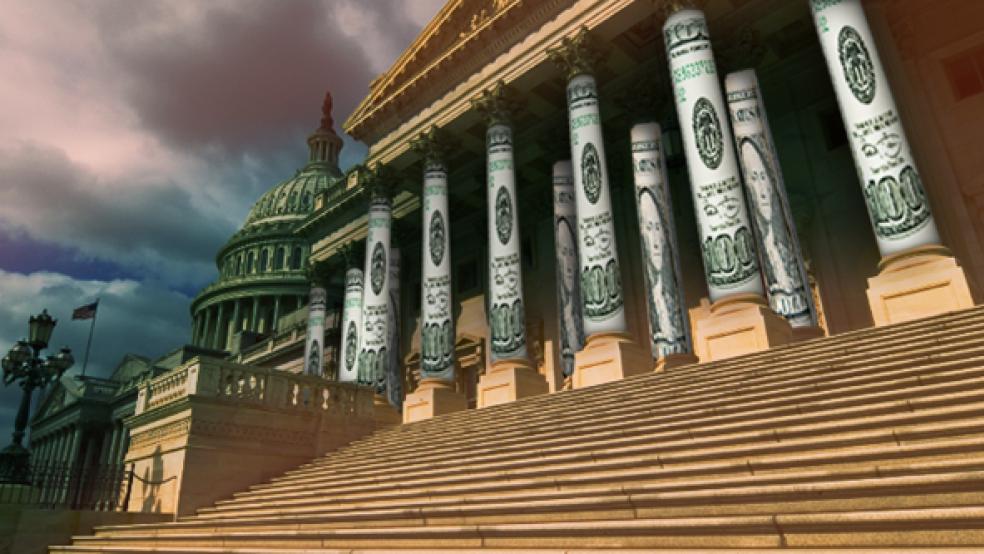Senate Majority Leader Mitch McConnell and Minority Leader Chuck Schumer on Wednesday announced a bipartisan agreement on a budget that would boost federal spending by $400 billion or more over two years. Here's what critics are saying:
House Conservatives Aren’t Happy About the Increased Spending: “This spending bill is a debt junkie’s dream,” Alabama Republican Rep. Mo Brooks, who voted for the GOP tax cuts, said Wednesday. “I’m not only a ‘no.’ I’m a ‘hell no.’” Rep. Justin Amash, a Michigan Republican who also voted for the tax cuts, tweeted: “This spending proposal is disgusting and reckless—the biggest spending increase since 2009. I urge every American to speak out against this fiscal insanity.” And Rep. Mark Meadows, chair of the House Freedom Caucus, warned that the spending increases being cited would disappoint his members. If the Freedom Caucus and other conservatives balk because of the higher non-defense spending in the deal, as many as 100 Democratic votes would be needed to pass it. That might be an issue because …
House Democrats Insist Immigration Must Be Addressed: House Minority Leader Nancy Pelosi, who was involved in the negotiations on the budget deal, said Wednesday that she and many Democrats in her chamber won’t vote for the plan without a commitment from House Speaker Paul Ryan to allow open debate on an immigration bill, much like the promise McConnell made to end the government shutdown last month. “Why should we in the House be treated in such a humiliating way when the Republican Senate leader has given that opportunity in a bipartisan way to his membership?” Pelosi said, according to The Washington Post. And Rep. Luis V. Gutiérrez (D-IL) said any deal that fails to protect dreamers would be “a complete betrayal” of the party’s principles.
The Contrast With Obama-Era Budgeting Is Striking: “The irony here is palpable,” writes strategist Chris Krueger of the Cowen Washington Research Group. “A heavily Tea Party Congress … is going to tack nearly $2,000,000,000,000 onto the government credit card. The sequester relief package combined with the three tranches of disaster relief is more than half the Obama Stimulus, which was the Bunker Hill of the Tea Party movement in 2009. On the Road to Washington, the Tea Partiers experienced a religious conversion to supply siding fiscal doves. We suspect they will re-convert to fiscal hawks once they eventually return to the minority party in Congress.”
This Could Be a Starting Point for Real Progress: “The deal halts the ham-handed and destructive sequester process, gives predictability and stability to both defense and non-defense accounts, avoids another government shutdown, and holds out at least the promise that Congress can begin to appropriate and budget in an orderly manner in the future,” G. William Hoagland of the Bipartisan Policy Center said in a statement. “Can policymakers now focus on the true causes of federal deficits or will they continue to cross their collective fingers and hope that the economic impact of unprecedented deficits will occur on some other Congress’ watch?”
This Deal Shows How Broken Our Governing Process Is: Fiscal hawks warn that Congress is knowingly ushering in an era of permanent $1 trillion deficits, and doing it at a time when the economy is strong and the national debt is high. “This deal represents budgeting at its worst – each party is giving the other its wish list with all the bells and whistles included and asking future generations to pick up the tab,” Maya MacGuineas of the Committee for a Responsible Federal Budget said in a statement. “It’s one thing to have trillion-dollar deficits during a deep recession, but to create permanent trillion-dollar deficits projected during a time of economic expansion is the definition of irresponsibility. It’s a stunning fiscal picture and an unprecedented reckless path.”
Even Some Fiscal Doves Are Dismayed About the Deficit: Jason Furman, chairman of President Obama’s Council of Economic Advisers, tweeted: “I consider myself a deficit dove. I'm comfortable with 3% GDP deficits--and higher in downturns. I don't think deficit reduction should be our top priority. But, deliberately sending an essentially full employment economy into deficits of 5% to 7% of GDP is nuts.”
And the IPAB Repeal Shows How Hard It Is to Deal With Health Care Costs: “Tack on another $17.5 billion to deficits this decade, and possibly much more in the future as this eliminates one restraint on long-term Medicare spending,” Loren Adler of the Brookings Institution tweeted. And Larry Levitt of the Kaiser Family Foundation tweeted that “Potential repeal of IPAB, along with continuing delays in the Cadillac plan tax, reveals a bipartisan consensus that health care cost containment generally seems better in theory than in practice.”





